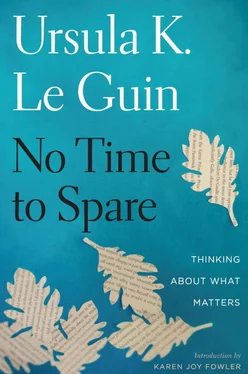The implacable editor in my hindbrain promptly inquired You hire someone not to open the mail? I silenced the meddling reptile, but the sentence continued to bother me. “These days I hire someone to do that.” What’s wrong with that? Well, I guess it’s the “someone.” Someone is no one. The nameless nobody hired to answer the mail of a somebody with a name.
So at this point I’m beginning to hope that the story is fiction and thus that the narrator is not Zadie Smith, because this doesn’t sound like the voice of a writer highly sensitive to class and color prejudices. It reminded me, in fact, of the dean’s wife, when I was a lowly assistant professor’s wife, who couldn’t leave “my housekeeper” out of her conversation for five minutes, she was in such a state of admiration of herself for having the grand house that required keeping and the housekeeper to keep it. But that was silly, naive, like Mr. Collins continually mentioning “my patron Lady Catherine de Bourgh.” The statement “these days I hire someone to do that” has a harsher ring to it.
And so what? Why shouldn’t a highly successful writer hire help and say so? And what skin is it off my nose?
Envy, of course, in the first place. I am envious of people who hire a servant with perfect assurance of righteousness. I envy self-confidence even as I dislike it. Envy coexists only too easily with righteous disapproval. Indeed perhaps the two nasty creatures live off each other.
And then, annoyance. There’s an “of course” implied in “I hire someone to do that,” and there’s no “of course” about it. But people think there is, and this kind of talk encourages them to think so—which annoys me.
It’s a widespread illusion: a writer (a successful writer, a real writer) doesn’t do her own mail. She has a secretary to do it, as well as helpers, amanuenses, researchers, handlers—lord knows what—maybe an editor’s hole in the east wing, like the priest’s hole in old British houses.
I imagine writers commonly had secretaries a century ago. Henry James did, sure enough. But Henry James was not exactly your average writer, right?
Virginia Woolf didn’t.
Among writers I know personally, only one has a secretary to do mail. To me it seems a perquisite of the extremely successful, and of a magnitude of success that daunts me. Privacy to be with my family and do my work was of the first importance to me. So when I began to need help answering my letters, I found it extremely difficult to convince myself that I needed it badly enough to justify my hiring “someone,” bringing a stranger into my study, setting myself up as a boss.
I always had trouble calling Delores my secretary, it sounded so pompous (echoes of “my housekeeper…”). If I had to speak of her to strangers I said her name, or “my friend who does mail for me.” But I knew that this latter phrase was one of the mildly devious devices by which we handle guilt, the ways we try to reintroduce humanity into the relationship of hirer and hired, which inevitably, to whatever slight a degree, involves inequality, the raising up of one and degradation of the other. Democracy, by strenuously denying the fact of inequality, does enable us, to a surprising extent, to act as if it didn’t exist; but it does exist, and we know it. So our job is to keep the inequity of power as small as possible, and refuse to let our common humanity be reduced, however slightly, even by a careless word, by an assertion of unequal worth. My envy of writers who hire a person to handle their mail and annoyance at people who assume that I have such help are really quite mild, but they are painful now, because I did have “someone,” but I have lost her.
Delores Rooney, later Delores Pander, was my helper and dear friend.
Thirty years ago or so, I finally got up my courage and asked around for a professionally competent and discreet person to give me a hand with my letters, which were getting beyond me. Our mutual friend Martha West, who had worked with Delores as a secretary in an office, recommended her. She was then working as manager-agent for a dance company. We rather nervously gave it a try.
I had never dictated anything to anybody (outside Beginning French courses, where you very slowly and clearly read a dictée in French to the students, who very slowly and inaccurately write it down). Delores had taught herself shorthand and was a whiz at it—a skill now, I suppose, almost entirely lost—and she’d taken lots of dictation from lots of dictators. She coached me in composing a letter orally, and encouraged me with praise; she was an excellent teacher. And also she’d worked and lived with artists, painters, dancers, and was used to artistic temperamental peculiarities, having a few of her own.
We got to doing letters quickly and easily, and I soon began to draw on her as a collaborator in composing the letters—what to say and how to say it. Does that sound all right?—What if you said this instead of that?—What on earth am I going to write to the man who sent me the 600-page manuscript about fairies on Venus?—This one’s a whiner, you don’t have to answer him… Delores was always better than me at kind answers to kooks, but she was tough-minded too, and encouraged me not to answer a letter that was troublingly weird or made unreasonable demands. She got to be so good at replying to the eternally repeated questions that I could hand her a letter and just say “idea for Catwings” and the true tale of how I happened to think of cats with wings was all ready in her computer—though she varied it slightly according to her mood and the age of the inquirer. She had a gracious, graceful tone in discouraging problematic requests by explaining why I couldn’t personally reply just now. She covered for me beautifully. She loved to answer children’s letters, even when they were the mechanical kind some teachers make kids write. The open kindness and generosity of her spirit lent all my correspondence a quality it would never have had without her collaboration.
She never came more than once a week, usually only once every three or four weeks. I’d do the most urgent business correspondence and let the rest and the fan mail pile up. She got a computer before I did, and it eased her work a great deal. When I got one, it didn’t make much difference at first. But when email really got going I began to be able to deal with all the real business myself. Still Delores and I together handled nonurgent business, the fan letters from readers, and what we called the Gimmies: the letters everybody who becomes visible to the public gets, asking you to do this, give to that, endorse this book, speak at that good cause, etc. Even if you can’t possibly say yes to them, most such letters are well intentioned and deserve a civil no. Delores said no thank you in every possible way, always politely. It was a great burden off me. She said that the Gimmies were boring but just various enough to be entertaining too.
As for fan mail, letters from readers have always come to me on paper only, my crude but effective way of keeping the volume down. The letters people write me—often with pen and ink, or in pencil, crayon, glitter, and other media if they’re children—are ever amazing, giving me immense pleasure and reward, but they are also never-ending. I knew there was no way I could handle the load if I tried to read and answer them on my website or on email. But I have always felt that such letters deserve a reply, however brief, and for years Delores was my invaluable aide in answering them.
We loved each other as friends, but didn’t have extensive contact outside our work sessions. She was a busy woman: she soon became the writer Jean Auel’s secretary four days a week, and was agent and manager for her husband, the painter Henk Pander; when her parents grew old and sick she looked after them, and late in life she adopted and brought up her granddaughter. Our friendship was expressed mostly during and in our working relationship. I always looked forward to Delores coming, and we always spent half the time talking, catching up. Once, when I was scared by a stalker, she and Henk gave me wonderful immediate support.
Читать дальше












